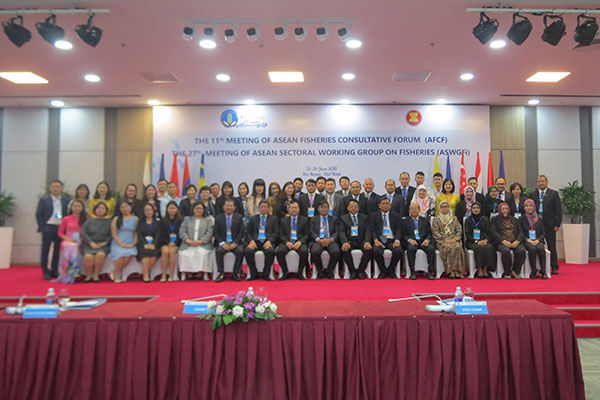- Giới thiệu
- Nhóm Công tác
- Tin tức
- Thông tin về FTA
- Tài Liệu
- Sự kiện
- Liên hệ
ASEAN countries consensus on cooperation and development of fisheries sector
From 24-29 June, a series of events were successfully organized in Da Nang City including the 9th Meeting of ASEAN Shrimp Alliance, the 11th Meeting of ASEAN Fisheries Consultative Forum (AFCF) and the 27th Meeting of ASEAN Sectoral Working Group on Fisheries (ASWGF) with many contents exchanged, discussed and approved.

ASEAN Member States with regional and international partners such as United Nations Food and Agriculture Organization (FAO), Southeast Asia Fisheries Development Center (SEAFDEC), Network of Aquaculture Centres in Asia-Pacific (NACA), development organizations from Japan, EU, Australia ... openly exchanged information, discussed on challenges to the fisheries sector in Southeast Asia and agreed on cooperation and development solutions, significantly contributing to the sustainable development of the fisheries sector, food security of the region and the ASEAN economic community.
At the 9th Meeting of ASEAN Shrimp Alliance, delegates agreed the need to assess the ASEAN Shrimp GAP system and study the establishment of the ASEAN Certification System to promote member states’ adoption of the ASEAN Shrimp GAP system as well as allowing this system to be recognized by the international market.
Countries also agreed that the exchange of information, research cooperation and improvement of shrimp farming in the region should be discussed based on the common interests and concerns of ASEAN member states.
In addition, to re-launch the website of the ASEAN Shrimp Alliance, delegates also agreed to update website information on feed, disease, shrimp farming, international market (tariff barriers), as well as scientific and technical research results related to shrimp farming.
In addition, the website will also be a place for researchers to publish their research related to farmed shrimp products. At the same time, this will create an information exchange channel for interested people. The website link will be shared widely via regional and international fisheries organizations such as NACA, SEAFDEC ...
For the farmed shrimp disease issues in the region, the members agreed to share and update information via NACA and ANAAHC.
At the 11th Meeting of ASEAN Fisheries Consultative Forum, participants were informed of the process proposing to evaluate the implementation of the Regional Plan Action for the Management of Fishing Capacity (RPOA-Fishing Capacity) as well as application results of FAO’s Voluntary Guidelines for Securing Sustainable Small-scale Fisheries in the Context of Food Security and Poverty Eradication (FAO’s SSF Guidelines) by ASEAN member states and regional and international fisheries organizations.
In response to climate change, Vietnam proposed a consultation workshop on the impacts of climate change on fisheries and aquaculture in order to develop Guidelines on the impact of Climate Change to Fisheries and Aquaculture.
In particular, with regard to the fight against illegal fishing, ASEAN Member States were informed about the Regional Plan of Action against Unreported and Unregulated Fishing (RPOA-IUU) to support member states to ratify and implement FAO's Port State Measures Agreement (PSMA) and develop a National Plan of Action Plan against Unreported and Unregulated Fishing ( NPOA-IUU), enforcing management measures against IUU, unifying cooperation among member states to combat IUU through information exchange and transparency mechanisms .
The 27th Meeting of ASEAN Sectoral Working Group on Fisheries adopted important guidelines on regional fisheries development in the period of 2019-2020. The ASEAN Member States agreed on the policy of establishing an ASEAN Network for Combating IUU (AN-IUU) with the aim of promoting information sharing and improving management capacity and combating against IUU among member countries.
At the same time, delegates also agreed to conduct a feasibility study on the application of the ASEAN's general fisheries policy to enhance joint efforts towards sustainable, responsible fisheries and food security in the region. In addition, the delegates also discussed and agreed to implement other important solutions of the region on sustainable fisheries development, strengthening the capacity to integrate into the world fisheries, ensuring food security, and adaptation to climate change./.
Tin liên quan
VIETRISA is responsible for certifying the National rice brand2024/04/08
1 million hectares of high-quality rice project: Large fiscal space for businesses2024/04/03
Research and selection of climate resilient crop varieties2024/03/23
Over 29,000 hectares of rice in the Mekong Delta are at risk of saline intrusion2024/03/11
Thailand expects Vietnam to impart its agriculture chain development expertise2024/02/23



 Điều lệ hoạt động
Điều lệ hoạt động



















































